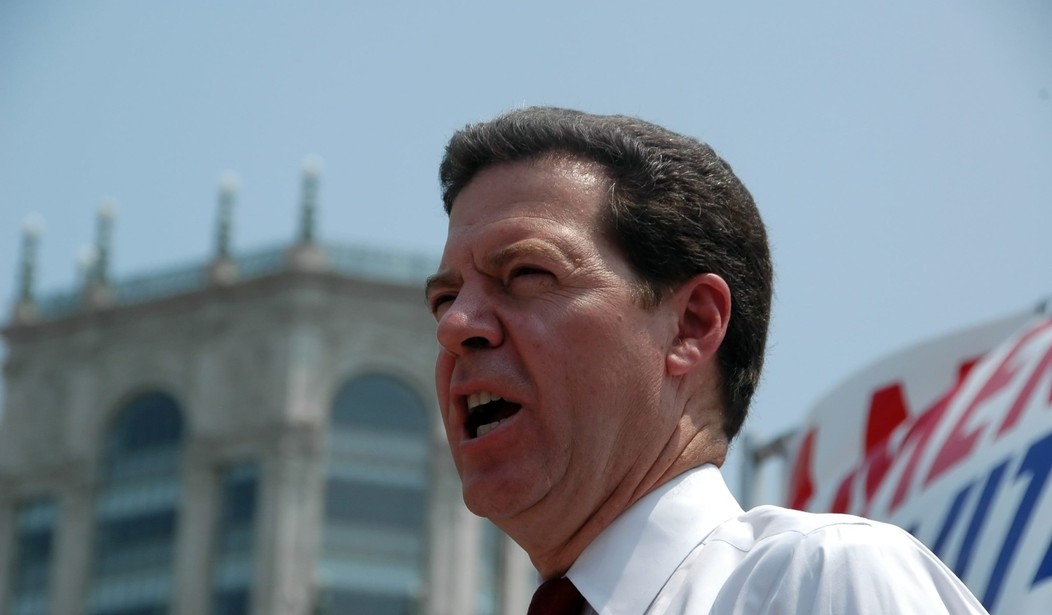Kansas Gov. Sam Brownback’s (R) critics say his 2012 and 2013 tax cuts have left the state without enough money to pay people what they are worth at state prisons or provide adequate staffing at mental health facilities.
Rather than facing up to what they see as an inevitable calamity, Democrats and some Republicans argued the 2016-2017 budget approved by House and Senate negotiators in Februrary would do little more than paper over problems for another year that were created by Brownback’s tax slashing of 2012.
Those on Brownback’s side of the debate, which has been conducted in a national mainstream media spotlight, counter that their opponents can’t see the macro for the micro. The whole point Brownback and his supporters say is that the tax-cutting plan was meant to trim state spending and shrink the size of Kansas’ government, so there naturally would be less money to spend on state services.
Dan Murray, the state director of the National Federation of Independent Businesses, the largest lobbying organization of small-business owners in Kansas, pointed to an American Legislative Exchange Council report, released in January, that he said shows Brownback’s opponents are ignoring statistics that prove the Republican has put Kansas “back on the right track.”
The ALEC report, “Rich States, Poor States,” authored by economist Arthur Laffer, said Brownback’s critics are not only ignoring evidence of success, but they have bought into mainstream media “myths” as “Kansas became the poster child of the pro-tax Left.”
As examples of media overkill, the report cited a column written by New York Times’ Paul Krugman in which he claimed those in favor of Brownback’s tax cuts were “charlatans and cranks” and a Los Angeles Times editorial that opined Brownback and his fellow tax-slashers were turning Kansas into a “smoking ruin.”
Still, Brownback would have to admit it hasn’t been easy to balance the books in Topeka ever since he pushed through proposals to cut personal income tax rates in 2012 and 2013. Not only did the plan cut the top tax rate by 29 percent, but more than 330,000 farmers and businesses owners no longer have to pay a dime in income tax.
Outrage was bipartisan.
PJM reported in June 2015 that Kansas Sen. Jeff Longbine (R) accused Brownback of using “political blackmail” to swing higher state sales and cigarette taxes.
“In the end, Kansas House members held their noses, gritted their teeth and approved Brownback’s budget plan at 4 a.m., June 12,” PJM reported. “Twelve hours after that, the Senate approved the plan, finishing a 113-day legislative session, which was the longest in the state’s history.”
Some of Brownback’s fellow Republicans continued to push Brownback to roll back his tax cuts in 2016.
Rep. Don Schroeder said “this house of cards can’t go on much longer,” and Sen. Susan Wagle warned, “We’re upside-down and need some long-term corrections.”
In his Jan. 2016 State of the State budget proposal, Brownback resisted calls to increase taxes.
“Our tax policy is working as evidenced by job creation, low unemployment, increases in wages for working Kansans, and people moving off of welfare and into self-sufficiency,” Brownback said.
He proposed redistributing state money by priority, and selling off assets of the Kansas Bioscience Authority, to cover a $170 million deficit in the $16 billion budget for the fiscal year that begins July 1.
The budget approved Feb. 17 by the legislature allows Brownback to shuffle funds from one agency to another. He can now take $25 million out of the state’s highway fund, cut the Kansas Public Employees Retirement System death and disability plan by $39.5 million and delay the state’s contribution to the KPERS pension fund, which could give Brownback access to close to $100 million.
Brownback’s opponents believe all he is doing is delaying a day of reckoning.
“Kansans are paying, literally, for the mismanagement of this governor,” House Minority Leader Tom Burroughs (D) said in response to Brownback’s January budget proposal.
Brownback spokeswoman Eileen Hawley told the Lawrence Journal-World that while Democrats and even some in the GOP warn “the sky is falling,” Brownback and his supporters “have chosen to participate in the government of the state” and have been “hard at work trying to resolve some of the very issues critics claim to be concerned about.”
The American Legislative Exchange Council’s “Rich States, Poor States” January report argued Brownback’s critics have consistently been wrong about the impact of lower state spending ever since the tax cuts were approved by the Kansas Legislature.
The ALEC report said that even though Kansas and Gov. Brownback took a lot of heat the past few years over the 2012 tax cuts, the ALEC-Laffer State Economic Outlook Rankings for 2015 that moved Kansas up to 18th from its 2012 ranking of 26th showed Brownback’s plan is working.
The report also cited a 2014 Creighton University report that showed Kansas had experienced a growth rate of 2.92 in personal income since the fourth quarter of 2012. The national average for the same period was 2.85 percent.
“The evidence is clear: Economic prosperity is attainable for those states that exercise discretion and discipline in spending and taxation,” said House Speaker Ray Merrick (R). “Pro-growth tax and fiscal policies set a clear path to a renewed national economic recovery.”









Join the conversation as a VIP Member